Pregnancy is a strange, exciting time. Often that excitement is coloured with nervousness and fear of the unknown; there are just too many things that can go wrong. And then there are so many horror stories about births that go wrong, of babies that are born somehow ‘wrong’ or evil, but what of the stories that make us fear the very act of being pregnant?
Rosemary’s Baby by Ira Levin
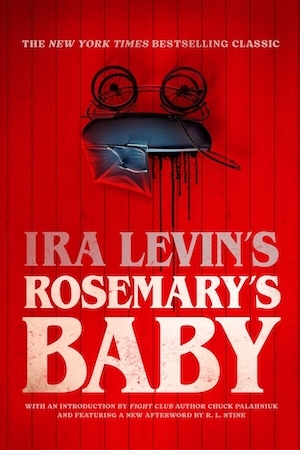
The most famous pregnancy horror of them all, Rosemary’s Baby was Ira Levin’s second book, but his best known. The story gained greater popularity following the Polanski film made the next year that stayed very true to the book, and has become a cinema classic. Levin writes about the titular young woman and her husband who move into an apartment in New York City, and find themselves befriended by a couple of creepy old neighbours. Of course, it’s no spoiler to say that Rosemary becomes pregnant and spends her entire pregnancy in an increasing state of fear that her neighbours have nefarious plans for her and her unborn child. We see her struggle to make sense of what is going on, we see her struggle to find a single person whom she can trust, we see her gaslit again and again and again—all the while sickened like she is, physically and with a fear of what the baby is. Rosemary’s paranoia isn’t unfounded—we know this, we can tell, like she can, that something terrible is going to happen. It’s the stuff of nightmares for any pregnant woman—you know you’re right, but no one is on your side. Gaslighting pregnant women into believing they are wrong seems to be a common theme in all pregnancy horror, but that’s hardly surprising.
Future Home of the Living God by Louise Erdrich
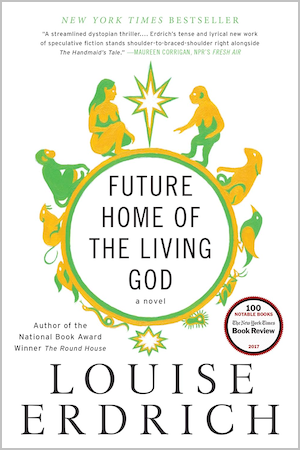
Set in a near, recognisable future where the planet has warmed up and snow is mostly a memory even in cold countries, a pregnant young Native American woman adopted by white liberals must find her biological parents to find out more about her genetic history. While Cedar is trying to understand her own ancestry, the world starts to stop, and evolution seems to be regressing. The government asks all pregnant women to turn themselves in to the state, but Cedar resists and goes into hiding—not just because she does not trust the state, with all the rumours of what they do to pregnant women in their ‘care’, but also because she is uncertain just what kind of baby she is carrying. The book is told as a letter from Cedar to her unborn child, and it explores the anxieties and fierce protectiveness of maternal instinct. Cedar’s feeling are complicated, more fearful than they should be. Around her, other creatures are evolving differently, rapidly—bugs are the size of cats, blue lizard like birds appear, experts claim that many animals have stopped ‘breeding true’. Is Cedar carrying a baby that is somehow less than human? Or, possibly more terrifying is the idea that she may be carrying a baby that is somehow more than human in a way the world can not understand, and will not accept.
Chouette by Claire Ohsetsky
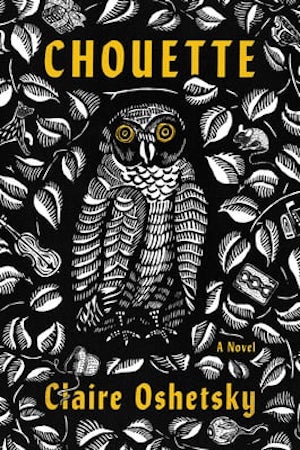
In a surreal take on what it means to expect to give birth to a being you know is going to be somehow very different, Chouette is a fascinating body horror take on both pregnancy fears and postpartum anxieties, as well as the difficulties of protecting and raising a child who does not fit into a conformist society. Protagonist Tiny is certain that she is growing a little owl-baby in her womb, after a clandestine night spent with a female ‘musky, moulting, monstrous’ ’owl-lover’. Her straight, serious but kind lawyer husband writes off her fears as nothing but hormone induced panic, and is confident that she is carrying their perfectly human baby. But as her pregnancy develops, Tiny finds herself being taken over by the owl baby she is gestating, with her body changing in strange ways as the foetus starts to hijack her. She begins to smell like rotting meat, she feels flaps of wings in her womb and the need to kill and devour small creatures, she finds herself being taken over as she plays her cello, her fingers playing what the baby wants instead of what she does. It’s as if she has been taken over by a parasite, one that will absolutely do what it needs to grow and survive—something anyone who has been pregnant will relate to. Tiny’s baby is born ‘broken’, with other disabilities that her husband and his family keep wanting to ‘fix’, but Tiny herself knows that her owl baby Chouette just needs to be who she is. Is Chouette really an owl, or is Tiny suffering from extreme postpartum depression? Is Chouette really an owl, or does she have special needs that Tiny is presenting as something surreal? Is Tiny an unreliable narrator, or is this a fabulist vision of pregnant and motherhood? Ohsetsky lets her readers decide.
Blue Ticket by Sophie Mackintosh
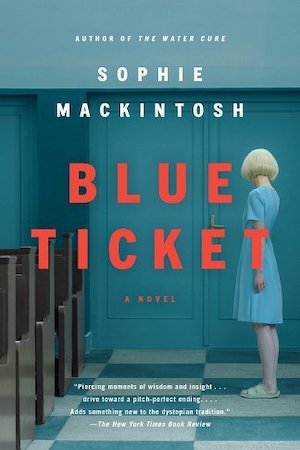
Here is a world where women are forbidden from doing it all: they are either to be mothers, or have careers. At her very first period, Calla is given a blue ticket, designating her to the group of women who have not been chosen to procreate in adulthood. As a Blue Ticket woman, it is illegal for her to conceive, and yet as an adult, it is all Calla wants. Enough that she manages to rid herself of her forced contraceptive device and get pregnant knowing that she will be hunted down and will have to survive the pregnancy on her own. In Blue Ticket, the pregnancy is fearful not just because it is illegal, not just because there are changes happening to her body that she cannot control and has no knowledge of (blue ticket women are not taught anything about pregnancy or birth or childcare), but also because her survival and that of the pregnancy are both at risk. And if she is to survive—the law that wants to hunt her down, the childbirth she knows nothing of—what sort of mother will she be, given she had been deemed unfit sat such a young age? What if her desire to have a child was all wrong, what if this pregnancy has done nothing but destroy her life? If she’d been given a choice from the start, would she have chosen this?
Sealed by Naomi Booth
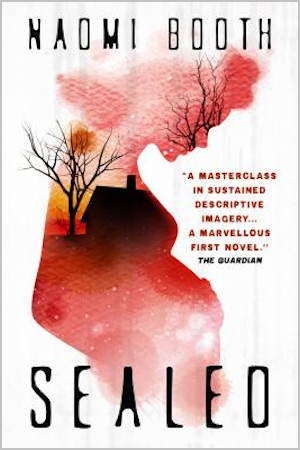
In this near future eco-horror story, environmental damage has started changing people’s bodies. Alice is a pregnant woman who wants desperately to get away from a strange phenomenon called Cutis in which people’s orifices are sealing over with skin. Alice is convinced that this is more widespread an epidemic than the authorities have let on, and so she leaves the city with her partner, though he is adamant that Alice is just hysterical and paranoid. But what if the body, with this new condition, is trying to protect itself from environmental poisons? What if it is sealing itself up from the outside for safety? A sort of extreme, misdirected response, as it were. Alice is convinced her own mother died of it, no matter what the medical experts say, and it is all she can think of during her pregnancy. Like Rosemary, Alice has a strong instinct that something is very wrong, and like with Rosemary, those around her try their best to convince her she’s just being paranoid. The fear Alice lives with while she is pregnant is a fear much like many pregnant women have—that of something going horribly wrong with childbirth. It is something she cannot control—no one can control what your body may need or want or do when it comes time to birth, no matter how much you may try to plan your birthing experience. Sheer terror at all the things that can go wrong during birth—now, with added new fear of your body sealing itself up, instead of opening it self up to create new life.











It looks like the text has the name wrong, but the picture of the book title shows it correctly- it’s Future Home of the Living God, not Home of the Future Living God.
Great list! I wish my libraries had more of these ebooks available, I’ll have to check if they’ve got them in print.
Fixed the title — thanks!